Hello,
There are a few things that I am not completely clear about.
The lipoma was not inside the abdomen it was between the skin and the abdomen. It is far more common to be here then inside rhe abdominal cavity. Also you wouldn’t get these seromas inside rhe abdomen.
Next seromas shouldn’t be painful. Maybe get in the way of using there, but not painful.
Lastly I only use a Darin of it is infected. And even then I am not an over ambitious drain user. It’s doctor preference.
Last I think it would be better for you to get a second opinion. Everyone might feel better with it
Good luck.
to start out I had a Jack Russell and our neighbor had a great dane. My Jack had gotten bitten by the great dane, so my vet was short of staff so I had to get him to a vet, well the neighbor called their vet and they said bring him in.This was a Wed, around 5 pm. Jack had a rip on the right shoulder and marks on his elbows. They stitch Jack up and put a drain tube in.They tell me to bring him back Monday to take out the tube, Ok now this is the following day, Thur. and I call and tell them Jack is not eating or drinking and He smells really bad.They say bring him in and that was 10 am and he was there till 7 pm. We get in the car to go home and I tell my boyfriend that he still smells bad. Well Fri. comes and I just baby Jack.Then Fri. comes and I call the vet and tell them Jack is not getting better and he still smells bad. They say bring him in, this was Sat., ok 3rd time to this vet and guess what she comes out and shows us his left shoulder that’s shaved and all black with a cut that was the smelly that I smelled for 3 days. I asked her why they didn’t see that and her reply was, are you ready for this?? Why didn’t You see it?? wth, I am NOT a vet I told her and after I told them on day 2 they should’ve found something??? We took Jack home and he was so uncomfortable that we took him to another vet at 5 am Sunday morning. They knew Jack was not doing good, they couldn’t find his blood pressure and then they found one at 18,she told us it should be 80.We left and was told if he was stable they would do a transfusion and we said whatever it takes.We get a call later saying he is not getting better so we went to see him and he was so weak and it just broke our heart to do what we had to do.We brought Jack home and buried him.
My advice to everyone if this happens get your friend shaved so this is not over looked. We miss this little guy every day and I know some people think we are nuts But his was our everything. The big kicker is no vet wants to help us because vets are their friends, Well if you are a vet for our friends you should help with anything that went wrong if not you are not a vet that cares about our friends and I think that is awful.
Hi! This is my first time posting here!
We are taking our baby Rusty to the Vet next week. He has been recovering from Parvo this past week after being hospitalized for 6 days. He is doing AMAZING. Eating great, keeping it down. Still has slight runny poop/diarrhea. But we know that was to be expected. No blood, colors great.
We take him to the vet next week for a check up to see how he’s doing.
My husband and I noticed a tiny red spot on his arm where his vitals/catheter was they stuck in him at the hospital. We thought at first he was just picking at a scab, so to prevent it I went to wrap it back up and bought a inflatable cone from Petsmart.
As I was about to wrap it up, I noticed it was a pretty big open area exposed. Looking closer, I see a tiny pinpoint hole in the middle. At first, I thought it was again from the vitals they put in his arm.
Looking on Google being paranoid, I came across the possibility of warbles. My heart sank.
I just wanted to know what you think. He has been doing so so well. All my life my family has had dogs but never have had this issue before.
You can see it is right above where his previous bandage at the hospital was.. so not sure if it is really from all the IVs or warbles.
I really appreciate the feedback. Thank you so much!
Comments
My Plott Hound had a large internal lipoma removed on Monday directly above his penis in his abdominal area. Almost immediately, he developed prominent swelling directly to, proximal, and distal to his operative site. In addition, he has swelling down his leg. Took him back to the vet where a needle aspirate was done. He was diagnosed with multiple seromas. There was no WBCs seen or anything else visualized under the scope to indicate infection INSIDE. However, externally, his skin is red and angry and there is a lot of swelling. He is on 2 broad spectrum antibiotics. He is having a hard time walking on his right leg. Took him back today (day 5 post op) because swelling is even worse. He has swelling all down his leg. Vet says it made sense to her because of gravity. My dog is in a lot of pain, can’t sit down. He put his paws down and his bottom stays up in the air. No one can even palpate his operate site without him going through the roof in pain. He is on Tramadol and an NSAID. I’m extremely worried. The vet isn’t a fan of the drain because she doesn’t want to create more room for infection. Ultra Sound showed no abscess. He is drinking a lot of water (more than usual) and urinating normally. His last BM was yesterday. Eating mostly fine. Low grade temp. Does this sound all right? I hate that he is suffering. The pics I have included were yesterday, not today. But you get the idea of the areas of seromas and erythema. Today, the swelling is worse and his entire leg down to his paw is fluid filled.
Comments
a while ago my cat became sick, around the same time we noticed he had been leaving our house and stealing cat food from the neighbors who leave it out for other stray cats (therefore he was eating after other cats) his lymph nodes became swollen, he stayed in one spot all day and rarely moved, he wouldn’t eat or drink, and lost weight. We brought him to the vet and they examen him and did x-rays and said that it appears that he could have cancer/a tumor that has spread to his lymph nodes already as well as some other things like fluid/pus in his chest. They said the cancer was very aggressive since it’s already gotten that far and we just noticed it. A few days later his lymph node swelling went away, he started eating and drinking again, and he was acting like himself. We brought him back to the vet and they performed FNA on the tumor which came back inconclusive. They were also shocked that his lymph node? weren’t swollen anymore, and they said the tumor had moved places, and they started to question their diagnosis saying that he could just have an infection. The gave him antibiotics and sent us home. Since then the tumor has gotten bigger and moved places, it feels sort of soft and moves around easily. I’m questioning if this is just a lipoma rather than cancer because of the way it feels and moves, it has also been about 2 months since we very first noticed this, and to me it doesn’t appear or feel to have spread anywhere, his vet was also talking like he wouldn’t live more that a week or two and it’s been 2 months. No one can really come to a definite diagnosis… so if anyone could give advice or help on this i’d appreciate it very much!! (i’ve also included a photo below of the tumor though it’s a litte difficult to tell)
Comments
Help! My dog raided my garbage bag and ate a cooked turkey bone? Is there anything I can do besides watching my dog for signs of distress?
Comments
My parents’ cat, Oso, is not doing so well. He’s been needing subcutaneous fluids administered via IV and he had not been eating every meal for a little over a week until we started giving him an appetite stimulant.
He also is having labored breathing, mouth closed 36 – 42 inhales/ minute. Here’s a link to a video so you can see: https://www.dropbox.com/s/elf32wwm5z06ygn/OsoBreathe.mov?dl=0
An image of an X-Ray is attached – The comments below and the color arrows were provided by a mobile radiologist that came over to see him – I didn’t understand the notes, but basically she was pointing out tumor(s), cancer and fluids building up inside his body there.
We are continuing with the fluids and with the appetite stimulant he is eating. Steroid once month shots have been suggested and were just started 2 days ago.
Any advice here is very much appreciated and welcomed.
Comments
Hello I recently watched a lot of your videos on youtube about ivdd and the beagle you were taking care of. My Gracie was diagnosed with ivdd yesterday and my vet gave her a steroid shot and she is now on steroid medication prednisone, pain killers and muscle relaxers. She is not able to walk or stand on her own, her right leg drags, her left leg seems normal. I have been using a makeshift sling to help her use the restroom, she is able to pee and poop on her own as long as I am helping her stand outside with a sling. She sometimes sits up in bed but mainly only using her upper body. Is this a good sign? My vet said I need to put her on a diet and give her strict rest but my vet also said if she is not better in two days I should take her to get surgery. I am relucatant to get surgery not just because of the cost but because my Gracie is 11 years old and I am afraid that it could worsen the paralysis in her other legs or it might be only a temporary fix. Me and my parents want to try naturally helping her, and I am not sure how to start or what to do. Should I just try making her get strict cage rest and see what happens or should I start physical therapy right away? I am planning on calling my vet to see what she thinks but from what she told me yesterday she seems pretty set on surgery only. Gracie has only been laying on one side when laying down. Her left side. Her right side is the side with the bad dragging leg. She is eating well and drinking well, I just want her to get better soon. Any advice or suggestions you can give me would be great. Thank you Krista.
Sincerely,
Gracie’s mom.
Comments
Hi!
For a couple weeks I have noticed my dog chewing on his back paw… he normally has pretty strong allergies this time of year and he is a licker anyway.. however tonight when I got home from work I took another close look at his paw (it was looking very pink) and noticed that he is missing a nail.. it’s completely gone ! He is in no pain as it seems.. hes walking, running, playing and eating as normal.. the only thing is he is obviously licking the area where his nail was.. it’s not bleeding and doesn’t look infected…
what advice do you have for this type of situation? I have been reading and watching videos about this but it’s half and half of I should take him to the vet or if I can take care of this at home.. Thank you
Comments
Hi, my cat Daisy recently had major dental surgery to remove 12 of her teeth. She did well through it but shortly after started to pull her hair out as she grooms. Wherever she has rested there are clumps of hair and it’s primarily on her thighs. She’s eating well, acting normal and using the litter box normally. Can you help?
Comments
i believe my cat has hepatic hepatic lipidosis lost alot a weight had her to two vets in the past year that did nothing i thought she was doing better but this past month she has lost a lot of weight only 5 pounds she eating but not as much i say hepatic hepatic lipidosis because the last vet said her liver reading was off wanted 800.00 for a biopsy after i already paid for 400.00 for blood work i couldn’t afford it i lost my job during pandemic and just can’t afford a vet visit at the moment anything i can do???






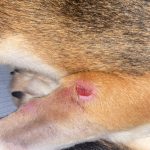
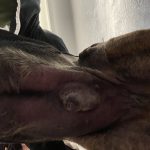
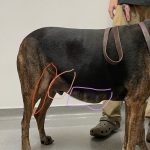
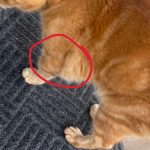

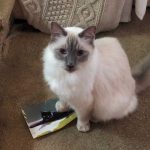
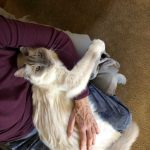
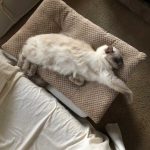
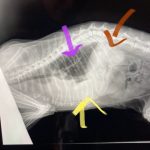
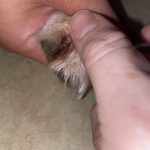
Hello! Welcome! I am so happy for you to hear that your pup is doing so well. Parvo is my most dreaded diagnosis as it always hits the very young and often it is either too expensive for people to treat it too severe for dogs to survive.
I would place the ecollar and make sure he can’t lick the area. And I would also keep it cleans and dry. I usually don’t wrap it because it can be too tight and cause really bad problems for rhe leg and cover up a wound I would rather have people observing daily. Covered up leans you can’t see it and I want to to be monitoring it.
If it worsens call your vet and have it looked at asap.
Good luck